Understanding Holistic Addiction Recovery
In recent years, the concept of holistic therapy has gained traction within addiction recovery programs, offering a comprehensive approach that addresses the multifaceted nature of addiction. Unlike traditional methods that prioritize medical interventions, holistic care integrates a mix of mind, body, and spirit practices aimed at treating the whole person. This article explores how these programs create a nurturing environment where clients can find balance, healing, and rejuvenation in their recovery journey.
What Is a Holistic Approach to Addiction Recovery?
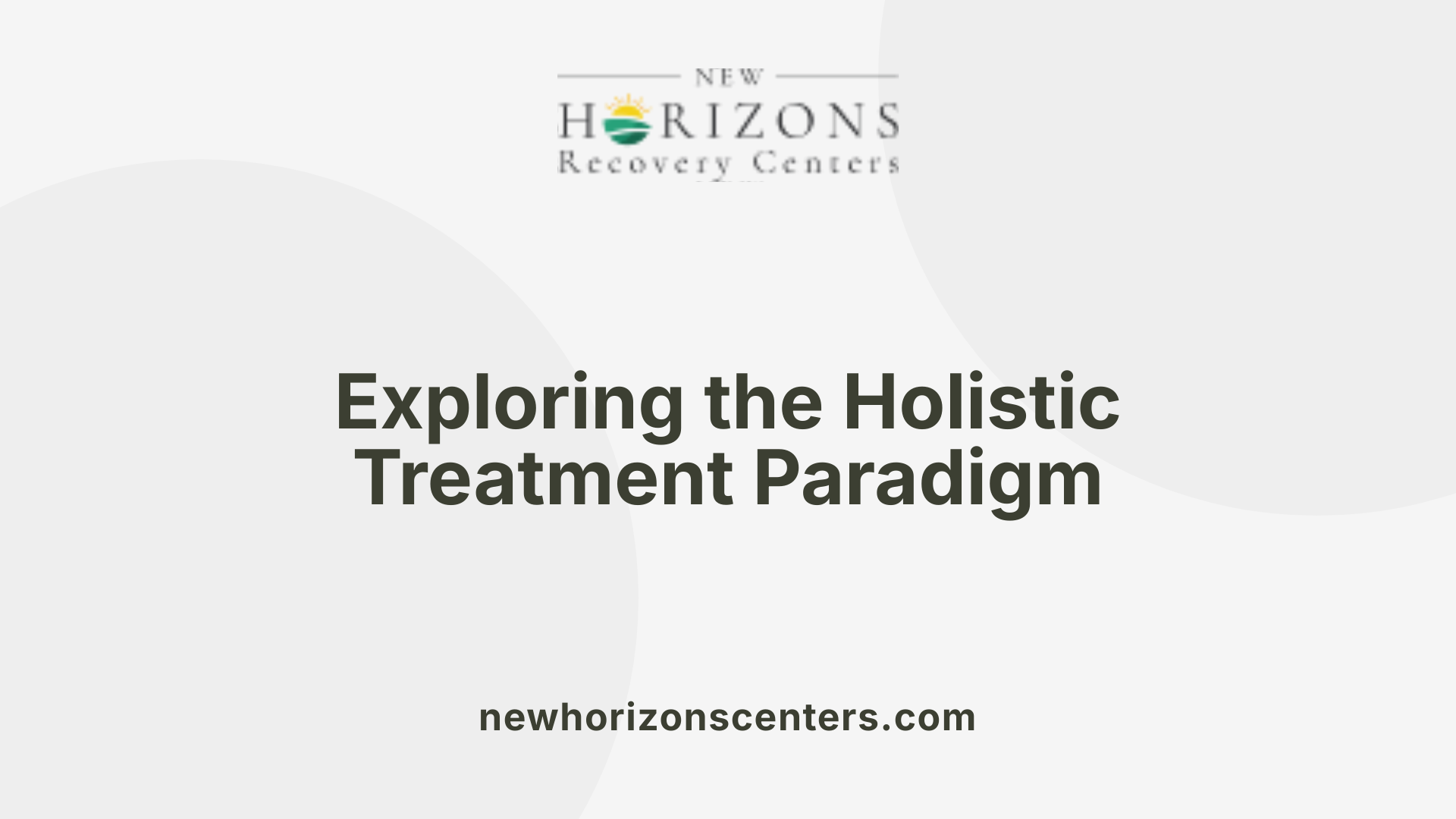
What is a holistic approach to addiction recovery?
A holistic approach to addiction recovery treats the individual as a whole, recognizing the significance of mental, physical, and emotional well-being. It integrates various practices such as nutritional counseling, mindfulness, yoga, meditation, and expressive arts therapy to promote balance and harmony in a person's life.
This comprehensive method encourages active participation in the healing process, fostering inner resources for long-term mental wellness. By teaching effective coping skills and tools, it aims to maintain lasting recovery beyond treatment.
When combined with traditional evidence-based methods, holistic therapies can enhance recovery success and promote personal growth. The approach acknowledges all aspects of a person's life, greatly contributing to overall healing and improved quality of life.
Integration of mind, body, spirit practices
Holistic addiction recovery emphasizes the interconnectedness of mental, emotional, and spiritual aspects. Mindfulness practices like yoga and guided meditation serve to relax the mind while fostering emotional resilience. Furthermore, practices such as nutritional therapy address physical health, vital for sustained recovery.
Benefits of a Holistic Approach to Recovery
| Aspect | Practices | Benefits |
|---|---|---|
| Mental Health | Mindfulness, CBT | Reduced stress, improved focus |
| Physical Health | Yoga, Nutritional Counseling | Greater energy, better overall fitness |
| Emotional Well-being | Art Therapy, Music Therapy | Enhanced self-expression, emotional relief |
| Spiritual Connection | Meditation, Spiritual Growth | Sense of purpose, emotional grounding |
Whole-person treatment
Such treatments not only aim to relieve addiction symptoms but also address underlying issues like trauma and stress. By using personalized treatment plans that consider an individual’s unique challenges, holistic approaches work towards achieving optimal health and resilience against relapse.
Overall, a holistic approach recognizes that true recovery is achieved through a balance of mind, body, and spirit.
Differences Between Holistic and Traditional Treatment Methods
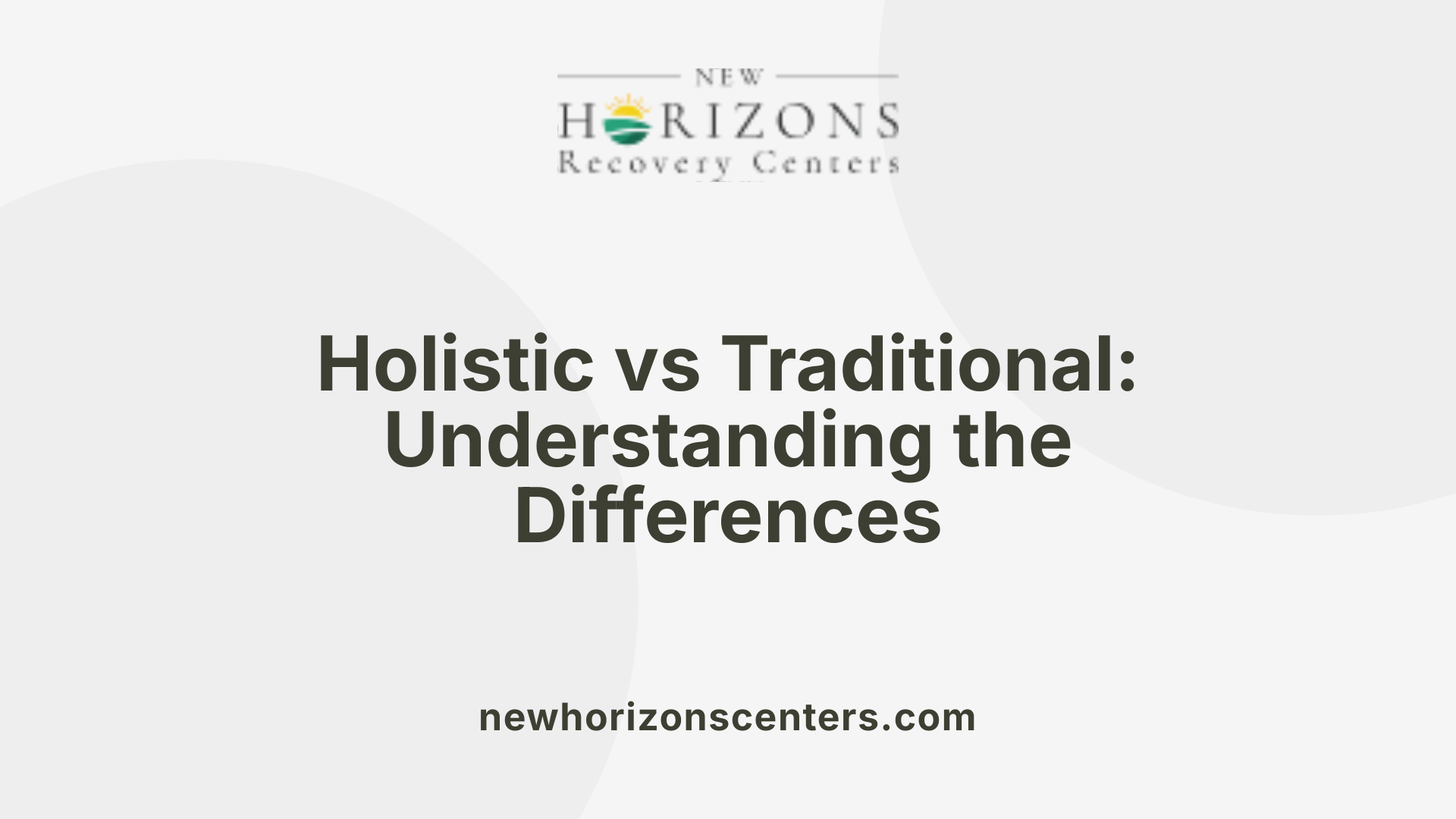
How do holistic and traditional addiction treatment methods differ?
Holistic and traditional addiction treatment methods diverge significantly in their approaches and philosophies. Traditional treatment typically employs a disease model that emphasizes medical detoxification, counseling, and medication to address addiction as a physical and psychological issue. This often leads to a primary focus on symptoms and reliance on medical interventions.
In contrast, holistic treatment considers the entire individual. It aims to restore balance among physical, mental, emotional, and spiritual aspects through various alternative therapies such as mindfulness, yoga, and acupuncture. These methods target the root causes of addiction, fostering a comprehensive understanding of an individual’s needs.
| Criteria | Traditional Treatment | Holistic Treatment |
|---|---|---|
| Philosophy | Disease model focused on symptom management | Integrative approach emphasizing the whole person |
| Primary Focus | Detox and medication | Balance and well-being through alternative therapies |
| Treatment Outcomes | Short-term symptom relief | Sustainable lifestyle changes and self-efficacy |
While both methods aim for long-term recovery, holistic approaches empower individuals to take an active role in their healing journeys. This integrative perspective promotes self-efficacy and equips clients with tools to manage their well-being beyond treatment.
Therapies Employed in Holistic Recovery Programs
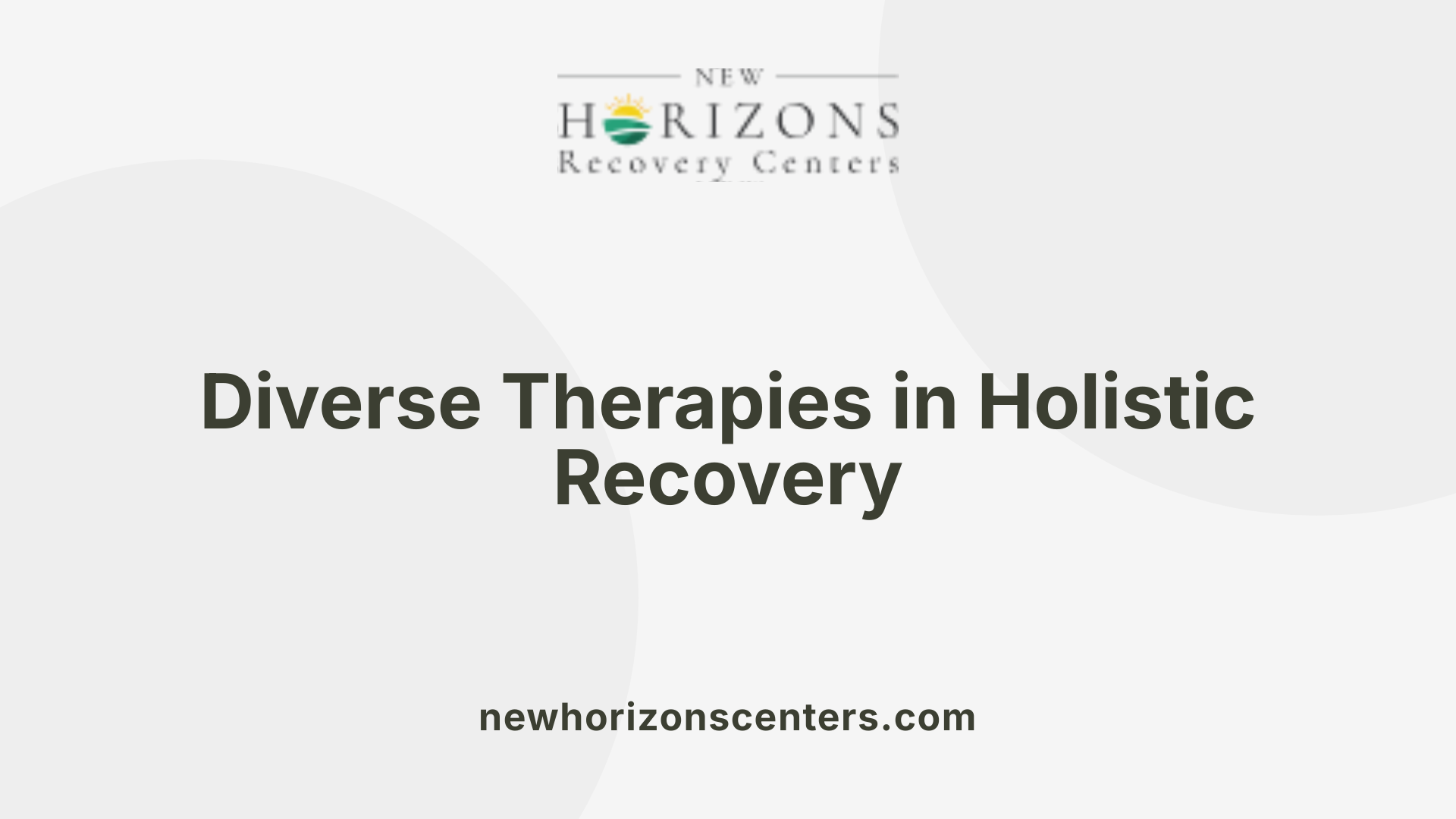
What specific therapies are used in holistic addiction recovery programs?
Holistic addiction recovery programs employ a diverse range of therapies to address the mental, physical, emotional, and spiritual well-being of individuals. Common therapies include:
- Nutritional Counseling: Aims to restore physical and mental health through balanced diets.
- Yoga: Enhances physical fitness, promotes relaxation, and improves mental clarity.
- Mindfulness and Meditation: Focuses on living in the moment to reduce stress and enhance emotional regulation.
- Art Therapy: Provides an outlet for self-expression, helping individuals explore their feelings and experiences.
- Music Therapy: Aids emotional processing and provides relaxation through musical engagement.
- Hypnotherapy: Addresses underlying psychological issues linked to addiction.
- Nature Therapy: Encourages healing through connection with the natural environment.
These programs often complement traditional treatments like Cognitive Behavioral Therapy (CBT) and Medication Assisted Treatment (MAT), blending methods for a comprehensive healing experience.
How do customizable treatment plans work?
The holistic approach is highly customizable to meet individual needs, recognizing that each person's journey is unique. Treatment plans are tailored based on personal history, specific challenges, and preferences, ensuring targeted support that considers all aspects of the individual's life.
The goal of holistic treatments
Ultimately, the goal of holistic treatment is to help individuals not only overcome their addictions but also develop healthier coping mechanisms and improve their overall quality of life. Incorporating both traditional and alternative therapies forms a robust support system for long-term recovery.
Benefits of Holistic Methodologies in Recovery
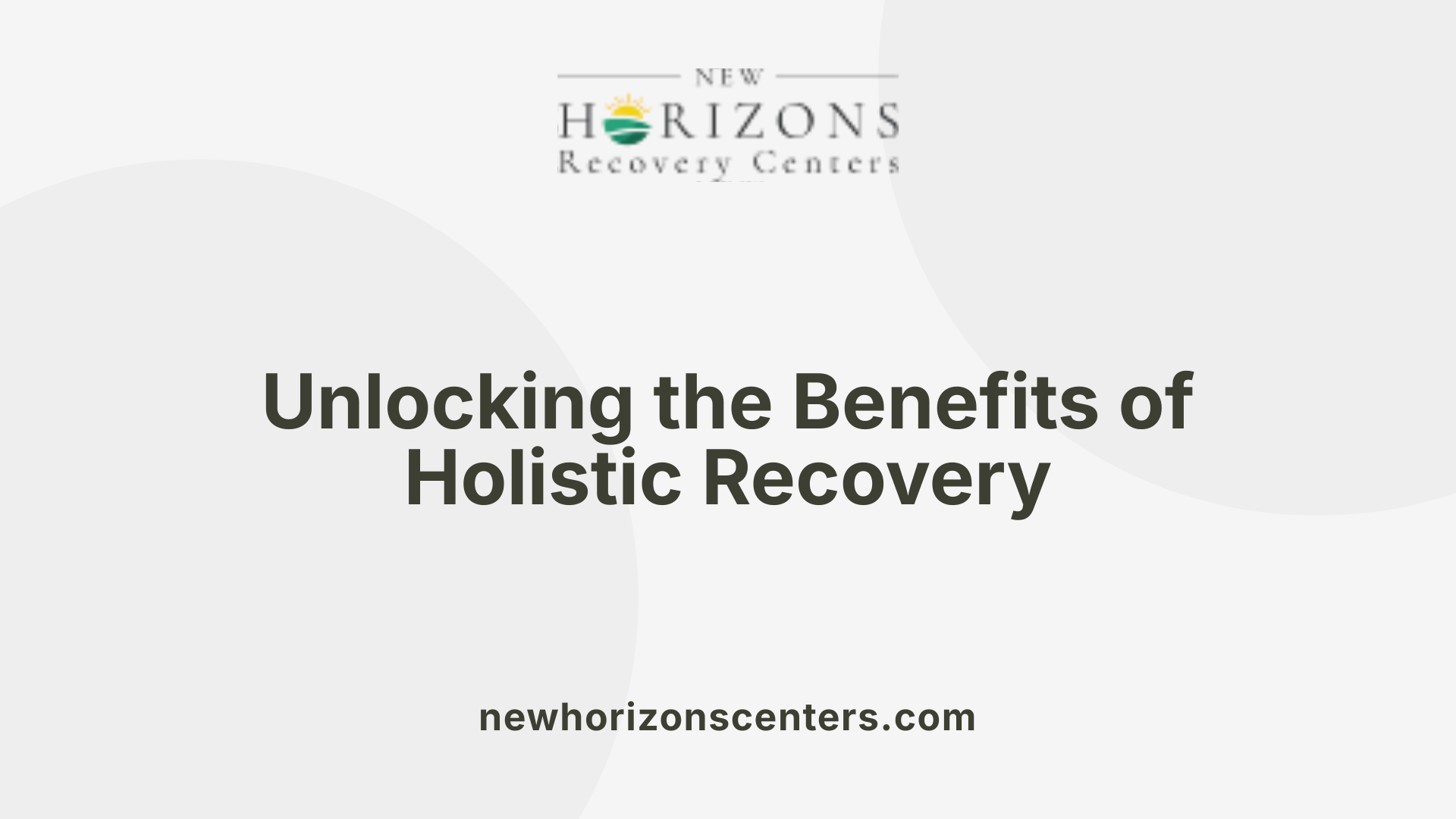
What benefits can holistic treatment methodologies offer in addiction recovery?
Holistic treatment methodologies present a wide array of benefits in the context of addiction recovery. Central to these approaches is a focus on the individual’s overall well-being, which encompasses their physical, emotional, and spiritual needs. By emphasizing the interconnectedness of these dimensions, holistic treatment acknowledges that recovery is not merely about addressing substance use but nurturing the entire person.
Addressing Overall Well-being
Holistic methodologies often incorporate practices like yoga, acupuncture, art therapy, and guided meditation. These practices promote relaxation while also enhancing self-awareness. Such activities help individuals connect with their emotions and foster a deeper understanding of their triggers, paving the way for more effective coping strategies.
Emphasis on Emotional Balance
One of the significant advantages of holistic treatment is its focus on fostering emotional balance. By tackling the root causes of addiction through therapies that enhance emotional resilience, individuals can experience reduced anxiety and improved mental health. Such emotional stability is critical, especially when facing the hurdles of recovery.
Long-term Benefits
The benefits of holistic methodologies extend beyond immediate recovery. By encouraging the development of stronger coping mechanisms, these approaches equip individuals with tools to navigate challenges they may encounter long after treatment. This foundation promotes sustained long-term recovery, contributing to a more balanced and fulfilling life.
In summary, holistic treatment methodologies not only address the symptoms of addiction but also invest in the overall health and well-being of individuals, leading to better recovery outcomes.
Nutritional Counseling's Role in Recovery
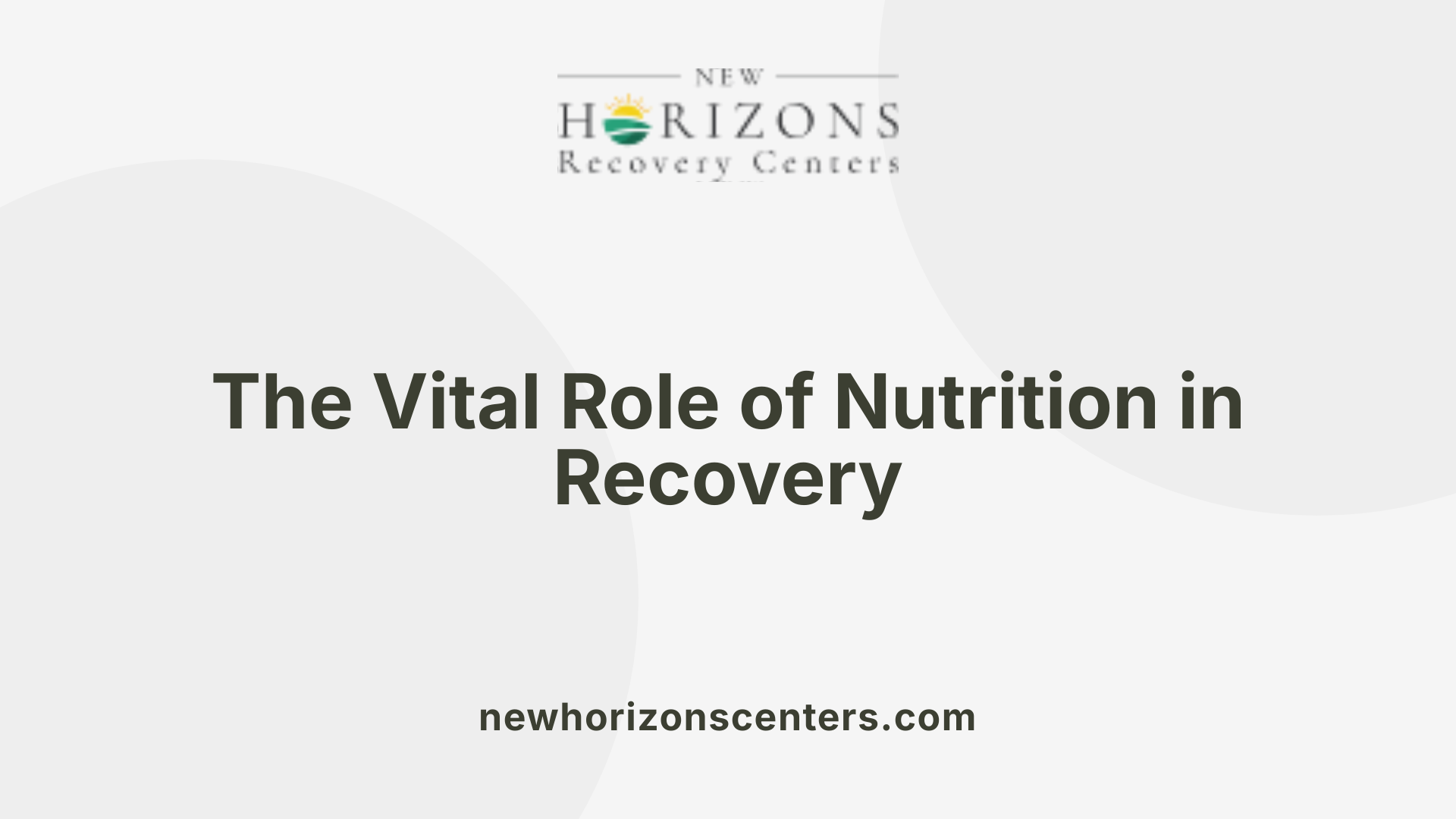
Importance of Nutrition
Nutritional counseling is an essential component of holistic addiction recovery. It plays a crucial role in addressing both the physical health and nutritional deficiencies that can arise from substance abuse. Individuals recovering from addiction often experience malnutrition, which can significantly impair cognitive functions and decision-making—key aspects for successful recovery.
Physical and Mental Health Benefits
A well-balanced diet helps in stabilizing mood, reducing cravings, and promoting overall mental well-being. By restoring physical health through proper nutrition, clients can enhance their emotional resilience, leading to a better quality of life. Nutritional therapy not only assists with physical healing but also helps in developing healthier coping strategies, essential for long-term success in recovery.
Addressing Deficiencies
Substance abuse often leads to nutrient imbalances. Nutritional counseling targets these deficiencies, aiding in the repair of physical damage caused by addiction. This comprehensive approach not only fosters recovery but also decreases the risk of relapse, demonstrating the importance of nutrition in creating a robust foundation for healing.
| Aspect | Explanation | Benefits |
|---|---|---|
| Physical Health | Restores nutrient balance, promotes healing after physical damage caused by substances. | Improves energy levels and overall physical health. |
| Mental Health | Stabilizes mood and reduces cravings through proper nutrition. | Enhances emotional resilience and decision-making. |
| Coping Strategies | Teaches individuals how to use nutrition as a tool for building healthy habits and coping mechanisms. | Encourages sustainable, long-term recovery. |
Addressing Mind, Body, and Spirit in Recovery
Spiritual Therapies
In the journey of recovery from addiction, spiritual therapies play a crucial role. They offer individuals a chance to reconnect with their sense of purpose and inner strength. Practices such as meditation and participation in spirituality groups help cultivate a supportive environment where individuals can explore their beliefs and emotions. This spiritual grounding is essential as it can provide comfort and an anchor during challenging times, which is often a pivotal aspect of healing.
Mind-Body Practices
Mind-body techniques are integral to holistic addiction treatment. Approaches like yoga and mindfulness meditation directly address the connection between mental and physical health. These practices not only promote relaxation and reduce stress but also enhance emotional regulation. Regular participation in such activities has been shown to improve focus, alleviate anxiety, and manage cravings, supporting individuals to stay grounded in their recovery journey.
Emotional and Psychological Well-being
The emotional and psychological aspects of recovery cannot be overlooked. Holistic approaches incorporate therapies such as art and music therapy to facilitate expression and healing. These creative outlets enable individuals to process their experiences, nurture their emotional health, and build self-esteem. By addressing underlying psychological issues, holistic therapies empower clients, equipping them with tools to sustain their recovery and maintain long-term well-being.
Comprehensive Holistic Care Models
Interdisciplinary Teams
Comprehensive holistic care models in addiction recovery often involve interdisciplinary teams. These teams typically combine various specialists such as psychologists, nutritionists, physical trainers, and alternative therapy practitioners. The aim is to create a supportive environment that addresses all facets of an individual's health, ensuring that psychological, emotional, and physical needs are met.
Integration of Traditional and Holistic Care
The integration of traditional and holistic care is essential for effective treatment. Evidence-based approaches like Cognitive Behavioral Therapy (CBT) and Motivational Interviewing work hand-in-hand with holistic modalities such as yoga, meditation, and nutritional counseling. This dual approach not only alleviates withdrawal symptoms but also tackles underlying emotional and psychological issues, paving the way for a more sustained recovery.
Personalized Recovery Plans
Personalized recovery plans are at the heart of holistic care. These plans are tailored based on comprehensive assessments that consider each individual's unique history, challenges, and goals. By customizing treatment, healthcare providers can better address the multifaceted nature of addiction, helping patients navigate their recovery journey with a focus on self-awareness and empowerment.
| Element | Description | Benefits |
|---|---|---|
| Interdisciplinary Teams | Specialists from various fields collaborate | Holistic approach addressing all aspects of care |
| Integration of Care | Combining traditional and holistic therapies | Comprehensive management of addiction and health |
| Personalized Recovery Plans | Tailored plans based on individual needs | Enhanced effectiveness and satisfaction in treatment |
Holistic Recovery: Beyond the Treatment Room
Holistic addiction recovery signifies a paradigm shift, demanding a reevaluation of what effective treatment entails. By offering a nurturing, inclusive treatment environment, these programs transcend traditional boundaries to address the entire spectrum of an individual’s life influences—emotional, physical, social, and spiritual. As holistic treatments continue to integrate with evidence-based practices, they promise a progressive path forward, crafting recovery journeys as unique as the individuals embarking upon them. This all-encompassing approach empowers clients with the tools and resilience necessary to not only overcome addiction but thrive beyond it.
References
- National Helpline for Mental Health, Drug, Alcohol Issues - SAMHSA
- What is a Holistic Approach to Addiction Recovery? | RCA
- An holistic approach to substance abuse treatment - PubMed
- Complete Guide to Holistic Addiction & Dual Diagnosis Treatment
- Texas Holistic Addiction Treatment Center - Ranch at Dove Tree
- Integrating Holistic Health Practices in Addiction Treatment Centers
- How Are Holistic Therapies Used in Addiction Treatment?
- Understanding the Importance of Holistic Recovery: Drug and ...
- Find Holistic Substance Abuse Treatments | GreeneStone Blog







